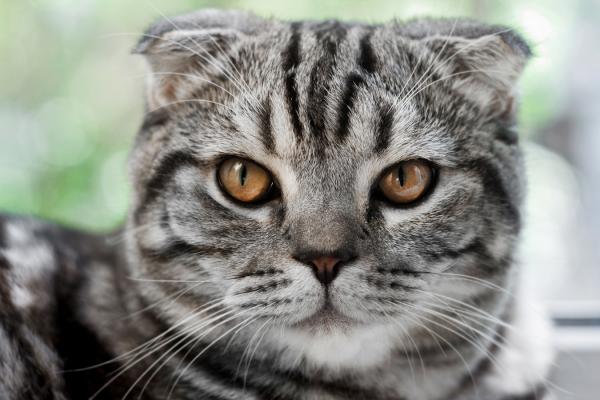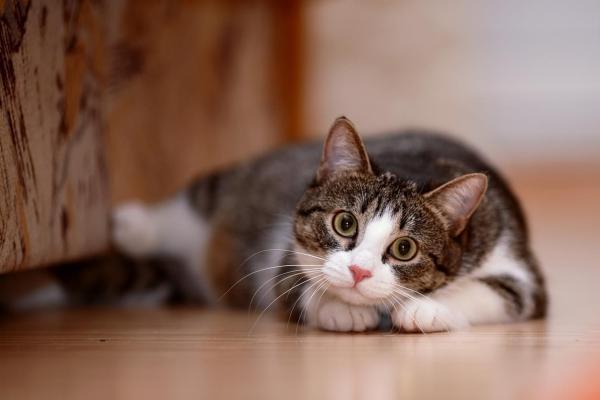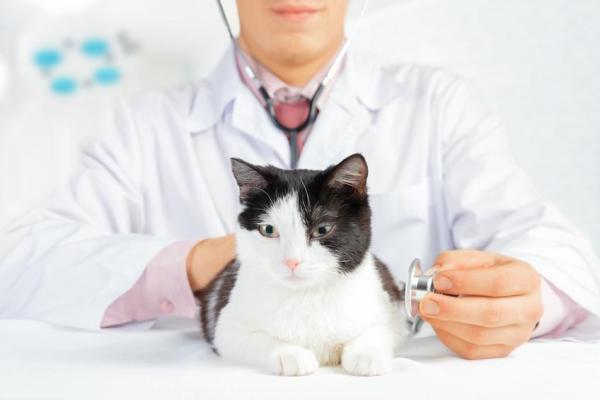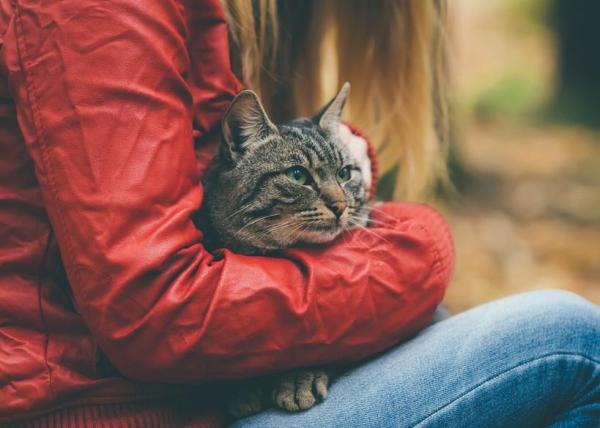
Have you noticed that your cat’s stomach is bloated and soft? Has your cat shown signs of abdominal discomfort and/or lack of appetite? If so, there is a possibility your cat is suffering from ascites, otherwise known as fluid in the abdomen in cats or abdominal effusion. If you notice that your cat is showing any symptoms of ascites in cats, veterinary treatment and diagnosis is required.
For more about the symptoms, causes, treatment and diagnosis of ascites in cats, keep reading here at AnimalWised.
Fluid in abdomen in cats
Also known as abdominal effusion, ascites in cats is not a disease in itself, but rather a clinical sign that alerts of a present pathology. This condition occurs when there is an abnormal accumulation of fluid in the abdomen. Ascites in cats can be caused by an osmosis spill through the blood vessels or the lymphatic system.
If you notice any of the below mentioned symptoms of ascites in cats, we recommend consulting a veterinarian as soon as possible. The accumulation of fluid in the abdomen in cats can lead to severe breathing problems, and if not treated accordingly and in time, can be fatal.
For more, we recommend reading our article where we discuss, ‘‘Why is my cat’s belly swollen and hard?’’

Ascites in cats: causes
Fluid in the abdomen in cats will result in an obviously swollen cat belly (edema). The cause behind this condition, which occurs in a cat’s abdominal area, varies largely. If you notice any of the below mentioned symptoms, veterinary attention is required in order to diagnose and treat this problem accordingly.
Some of the main causes of abdominal fluid in cats, otherwise referred to as the accumulation of abdominal fluid, include:
- Congestive heart failure on the right side
- Feline infectious peritonitis (FIV in English)
- Kidney disorders such as insufficiency, infection or kidney stones
- Liver disorders, specifically liver inflammation
- Blood circulation and coagulation disorders
- Hypoproteinemia and/or decreased levels of protein in the blood
- Bleeding tumors or abdominal cancer, especially in the liver
- Trauma accompanied by ruptured blood vessels and/or internal organs that causes abdominal bleeding
- Bladder rupture
For more about cat liver problems, we recommend reading our article where we discuss everything you need to know about hepatitis in cats.

Ascites in cats: symptoms
Among the main symptoms fluid in abdomen in cats include:
- Inflamed abdomen
- Lethargy and apathy
- Pain when moving and/or lying down
- Increase in weight
- Loss of appetite
- Anorexia
- Vomiting
- Fever
- Groans and moans
- Pain and sensitivity when touched
- Muscular weakness
- Difficulty breathing
In advanced cases, swelling of the scrotum may occur in males and vulva swelling in females. Furthermore, if part of the inflammation in the abdomen can also be observed in the chest, this can signify the presence of pleural effusion in cats (the accumulation of fluid in the pleura around the lungs). For more, we suggest taking a look at our article, my cat has swollen testicles: causes and treatment.
Ascites in cats: diagnosis
In order to diagnose abdominal effusion in cats, a veterinarian will complete a full physical examination as well as analyze previously extracted ascitic fluid. Additional tests for ascites in felines may include:
- Abdominal ultrasound
- Abdominal x-ray
- Urine analysis
- Blood tests

Ascites in cats: treatment
Treatment of ascites in cats depends largely on the root of the cause. For example, an infection will be treated with antibiotics, while trauma may require surgery. Tumors may require both surgery and medications. Additionally, a diagnosis should only be done by a professional.
When it comes to ascites cats treatment, ascitic fluid drainage is necessary. In addition, all felines suffering form ascites in cats should be offered a diet low in salt to avoid fluid retention. In some cases, a professional may also prescribe diuretics.
For more we recommend reading our article where we offer the perfect diet for cats with kidney stones.
Ascites in cats: prevention
It’s important to note that complete prevention of ascites in cats is not possible, as causes are so varied. However, there are some precautions which you can take to help reduce the risk of ascites in cats:
- Follow your cat’s vaccine schedule strictly.
- Do not let your cat leave the house without necessary safety measures.
- Make sure your cat stays away from windows and balconies to avoid falls.
- Do not medicate your cat on your own, always consult a veterinarian.
- Offer your cat high quality feed.

This article is purely informative. AnimalWised does not have the authority to prescribe any veterinary treatment or create a diagnosis. We invite you to take your pet to the veterinarian if they are suffering from any condition or pain.
If you want to read similar articles to Ascites in Cats - Causes, Symptoms and Treatment, we recommend you visit our Other health problems category.